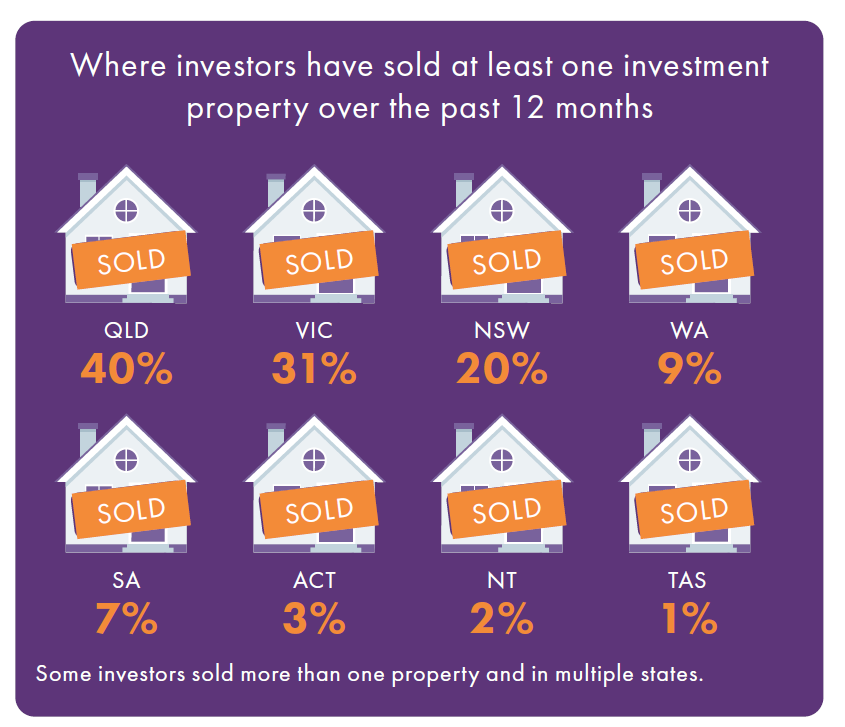Tenants hurt as the tussle with landlords continues

The sale of rental dwellings has surged as the war on landlords continues, a new report from the Property Investment Professionals of Australia shows.
PIPA’s ninth annual Property Investor Sentiment Survey showed that hundreds of thousands of rental properties have been stripped from rental markets across Australia, with Victoria and Queensland – the states leading the war on private landlords – in particular, getting deserted by property investors.
“A staggering 12.1% of investors sold one or more of their rental properties in the past 12 months around the nation,” PIPA chair Nicola McDougall (pictured above left) said.
“About 43% of respondents in this year’s survey sold to an existing homeowner, while 30% sold to a first-home buyer. Just 24% sold to another investor – down from 33% last year – which means the majority of those investment properties were likely removed from the rental market.”
Last year’s PIPA survey found 16.7% of investors had offloaded at least one property in the past two years.
“Clearly, this would explain the undersupply of rental properties available for tenants around the nation,” McDougall said. “These results are yet another stark illustration of the mass exodus of private investors from the market.”
With the 2021 Census used as the baseline of 2.477 million private rental dwellings in Australia, it is estimated hundreds of thousands of rentals were sold in the last three years, most of which were bought by existing homeowners or first-home buyers.
Investors leaving Victoria and Queensland
A deeper look into this year’s survey data showed that 24.8% of investors sold one or more properties in Melbourne over the past year, and 23.3% in Brisbane. Outside of the capitals, 16.4% sold in regional Queensland and 6.4% in regional Victoria.
Across the states, 39.8% of investors sold one or more properties in Queensland over the past year, while 31.35% sold in Victoria – overshadowing the results in all other jurisdictions.
These two states, McDougall noted, are in the grips of a rental crisis just like much of the country, driven by a critical undersupply of homes and significant demand from tenants.
“Those states are leading the charge with restrictive, unfair, and inefficient legislative reforms that adversely impact property investors,” she said.

The survey of 1,724 investors also revealed which states and territories the respondents do – and don’t – feel encouraged to invest their money in.
“Ranked from one to eight, one being the most accommodating and eight being the least, 57.4% scored Victoria an ‘eight’ and 23.5% scored Queensland a ‘seven’,” McDougall said. “Just 3.1% of respondents scored Victoria a ‘one’ and more scored Queensland in the upper quartile than the lower quartile.
“New South Wales is the place to invest, according to respondents, with 31.5% giving the state a score of ‘one’. Western Australia also did well, with 25.8% giving the state a ‘one’.”
Why investors are selling their properties
It is “attacks by governments” disguised as reform that is pushing investors to sell up or avoid buying, McDougall said.
“At a time when tenants can least afford it, the people providing the vast majority of rental homes are selling up in droves,” she said.
Governments increasing or threatening to raise taxes, duties, and levies was the top reason 47% of the respondents were finding it less attractive to hold an asset. Other major reasons for selling over the past year included changing tenancy legislation (43%), talk of rental freezes (34.6%) and rental increase limits or caps (27.7%).
Tellingly, these reform-related stressors were cited as reasons to sell disproportionately to surging interest rates and increased loan repayment costs (40.1%), negative cash flow due to higher mortgage costs (23.2%), a need to reduce total borrowings (33.1%), or offloading an underperforming asset (18.8%).
Merwyn Machado (pictured above right) is just one of the many property investors who sold one of his investment properties in Brisbane last year when changing laws and soaring costs became too much.
“It didn’t make sense to be negatively geared and cop rising land taxes and council rates again and again,” Machado said. “Plus, the Queensland government seems determined to try to ram through legislation that prevents landlords from looking after their property. I still have two investments in Brisbane, but I’m wondering why given the different ways the government and council are slugging me with taxes.”
More rental pressure ahead
Unfortunately, tenants face more rental pain, with the proportion of investors who feel it is likely they will sell within the next year for a variety of reasons hitting 38% – a sharp increase from the 19.2% in last year’s survey.
“Again, it’s not a mystery why so many investors are planning to exit the market,” McDougall said.
“Should governments further increase or introduce new taxes and compliance costs, 47.2% of respondents said they would be forced to increase rents.”
In recent times, Victoria has introduced a $5 billion land tax hike and removed caps on rental price increases or a rent freeze. Queensland, meanwhile, implemented, and then scrapped, a strange land tax grab last year, and rolled out capped rent increases with retrospective application this year.
“Both states continue to talk about further punitive rule changes being on the agenda, which strips away surety from investors and makes owning a rental in Victoria and Queensland highly unattractive,” McDougall said.
A core characteristic of repeated attacks on investors in recent years, she said, has been to paint property investors as greedy and opportunistic.
“It’s unfair and unhelpful, especially given our research shows 92% of investors are grappling with higher holding costs because of interest rates, higher mortgages, and inflation,” McDougall said. “Despite that, 55% of investors said they were passing on just 10% or less of these higher costs to their tenants. Another 26.9% reported passing on 11% to 25% of extra expenses in the form of rent increases.”
Use the comment section below to tell us how you feel about this story.



